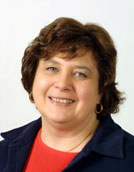In new study, teachers discuss challenges to their careers
 Too little respect, money and time are among the factors most likely to make new teachers leave teaching, says a new study by a Wake Forest University education professor.
Too little respect, money and time are among the factors most likely to make new teachers leave teaching, says a new study by a Wake Forest University education professor.
Using open-ended questionnaires, phone interviews and face-to-face interviews, Associate Professor of Education Leah McCoy sought to better understand teacher attrition from those who have most recently entered the classroom.
In the study, McCoy drew on the personal accounts of 105 middle and high school teachers in their first three years of teaching to identify factors that might lead them to leave the profession.
The focus of her study was to identify problems, but she also presents suggestions from some of the participants for addressing those problems.
The study, “It’s a Hard Job: A Study of Novice Teachers’ Perspectives on Why Teachers Leave the Profession,” has been published in the current edition of the online peer-reviewed journal, Current Issues in Education.
“Educators, administrators, and policymakers must understand the culture of teaching and respond to the voices of novice teachers in order to support and retain a quality teacher in every classroom,” said McCoy, who taught high school math for 13 years and directs Wake Forest’s graduate education program.
All of the participants were graduates of a master’s level teacher education program at Wake Forest. Some in the study left teaching after the first year; others stayed in the classroom, but talked about the challenges facing teachers that could influence them to consider changing careers.
The study gives insight into the perceptions, experiences and needs of novice teachers, McCoy said.
“Even though teaching is a hard job, many of the new teachers reported satisfaction in making a contribution to society, and said they enjoyed the energy and challenge in their work with young people,” McCoy said. “My hope is that in all of the current school reform, we consider the voices of teachers and make changes to facilitate their success.”
An analysis of their reflections provides an understanding of their motivations and their discouragements as they ponder their profession and decide whether to remain in teaching or to leave as many others have, McCoy said.
Based on responses received from participants, she focused on six problem areas: societal attitude toward teachers, financial issues, time scarcity, workload, working conditions, and relationships with students and parents.
“The participants in the study believed that the attitude of society toward the teaching profession was unfair and detrimental to their overall functioning. They did not believe that they were respected or valued, despite their advanced levels of education,” McCoy said.
A second key issue raised by the novice teachers was money. The majority of the participants in the study said they were simply not paid enough to live comfortably. One high school science teacher said, “I love teaching, but I don’t know if I love it enough to deprive my family and myself of necessities. I can’t see how I can ever save enough to make a down payment on a house, even with a second job in the summer.”
In addition to better pay, many teachers in the study favored a merit pay system to provide better incentives for teachers.
The third key issue mentioned by the new teachers was time.
“Many new teachers were physically and emotionally fatigued to the point of exhaustion,” McCoy said. “Based on what these teachers have said, the biggest problem they have is probably time.”
She cites comments from a high school English teacher: “During my first two years of teaching, I worked 70 to 80-hour weeks, including time worked during the school day, in the evenings and over the weekend.”
In a closely related area, workload, the study showed that completing all that was expected in one school day was nearly impossible, McCoy said. A high school history teacher said, “The workload is too heavy and could potentially be a factor if I leave teaching. The system is set up for mediocrity due to large class sizes, heavy outside requirements, and too many classes.”
Efforts need to be made not to give new teachers a schedule filled with the “worst” classes all day long, said one teacher. Another suggested first-year teachers should have one less class to teach than veteran educators to give them the same sort of “breaking–in” period that other professions allow for new employees. Smaller class sizes and more clerical assistance would also be helpful, study participants said.
The novice teachers also voiced concerns over working conditions. Due to overcrowded schools, many new teachers shared classrooms and often did not have the materials they needed to teach well. Also, many in the study expressed a desire for more constructive feedback from school administrators.
In the final problem area covered in the study, relationships with students and parents, novice teachers reported that management of student behavior, including motivation and discipline, is extremely challenging, with parents often failing to support their efforts.
Categories: Community Impact, Research & Discovery, University Announcements
Media Contact
Cheryl Walker
media@wfu.edu
336.758.5237



